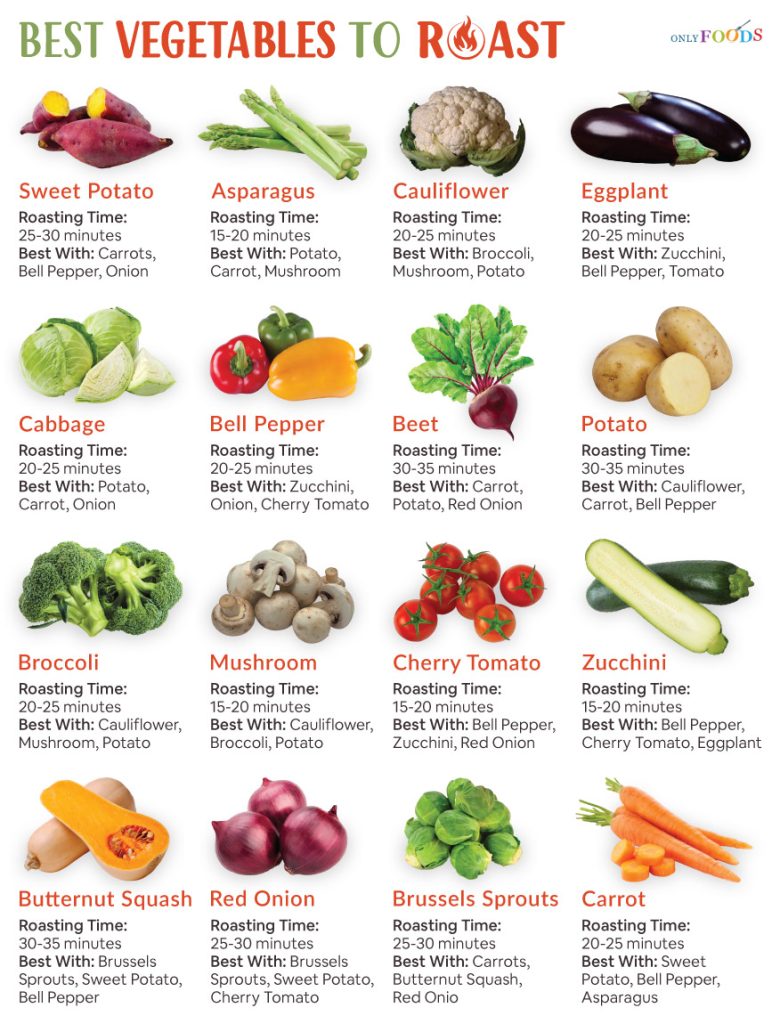Best Vegetables to Roast
Having vegetables for dinner may not seem like an appetizing idea, but that’s until you think of the heart-melting taste and texture of a bowl of roasted vegetables. The beautiful brown crispiness on the outside and the flavorful, soft insides easily make them the star of any meal.
Technically, you can roast any vegetable you want; there’s not much to it than cutting them up, tossing them in seasonings, and popping them in the oven. But like everything else, each vegetable is unique and reacts differently to the heat it receives during roasting. And then there’s the matter of what combines well with what and what should be the temperature and cooking time. Below is a list of vegetables most suitable for roasting.
Types of Vegetables Good for Roasting
Though you can always roast a vegetable independently, mixing 2-3 of them together makes things more interesting. But with their different textures and constituents, not all vegetables go well together. For example, those with a high water content, like zucchini, tomato, and eggplant, do not complement root vegetables when roasting because the extra moisture in the former ruins the latter’s texture.
Such high-moisture vegetables need a longer roasting time, while the temperature may also vary. Roasting is typically done over 420°F. The table below gives the approximate roasting times for each vegetable at 425°F, along with ideas for seasoning them.
| Name of Vegetable | Carbs per 100 gms, roasted | Calories per 100 gms, roasted | Roasting Time at 425°F | Best Together With | Recommended Spices & Seasoning |
|---|---|---|---|---|---|
| Brussels Sprouts | 11.3g | 50 kcal | 25-30 minutes | Carrots, Butternut Squash, Red Onion | Garlic, Thyme, Balsamic Vinegar |
| Sweet Potato | 19.6g | 90 kcal | 25-30 minutes | Carrots, Bell Pepper, Onion | Rosemary, Cinnamon, Paprika |
| Carrot | 8.2g | 41 kcal | 20-25 minutes | Sweet Potato, Bell Pepper, Asparagus | Dill, Honey, Cumin |
| Butternut Squash | 11.4g | 45 kcal | 30-35 minutes | Brussels Sprouts, Sweet Potato, Bell Pepper | Sage, Nutmeg, Cinnamon |
| Bell Pepper | 6.0g | 27 kcal | 20-25 minutes | Zucchini, Onion, Cherry Tomato | Basil, Oregano, Garlic |
| Zucchini | 3.1g | 17 kcal | 15-20 minutes | Bell Pepper, Cherry Tomato, Eggplant | Thyme, Rosemary, Parmesan |
| Cauliflower | 5.3g | 25 kcal | 20-25 minutes | Broccoli, Mushroom, Potato | Turmeric, Cumin, Coriander |
| Red Onion | 9.3g | 40 kcal | 25-30 minutes | Brussels Sprouts, Sweet Potato, Cherry Tomato | Thyme, Balsamic Vinegar, Rosemary |
| Cherry Tomato | 3.9g | 18 kcal | 15-20 minutes | Bell Pepper, Zucchini, Red Onion | Basil, Garlic, Olive Oil |
| Asparagus | 3.7g | 20 kcal | 15-20 minutes | Potato, Carrot, Mushroom | Lemon, Parmesan, Dill |
| Eggplant | 5.9g | 25 kcal | 20-25 minutes | Zucchini, Bell Pepper, Tomato | Basil, Garlic, Cumin |
| Potato | 17.5g | 80 kcal | 30-35 minutes | Cauliflower, Carrot, Bell Pepper | Rosemary, Thyme, Garlic |
| Broccoli | 5.4g | 28 kcal | 20-25 minutes | Cauliflower, Mushroom, Potato | Lemon, Parmesan, Garlic |
| Mushroom | 3.3g | 22 kcal | 15-20 minutes | Cauliflower, Broccoli, Potato | Thyme, Garlic, Balsamic Vinegar |
| Beet | 9.6g | 43 kcal | 30-35 minutes | Carrot, Potato, Red Onion | Dill, Honey, Olive Oil |
| Cabbage | 5.8g | 23 kcal | 20-25 minutes | Potato, Carrot, Onion | Dill, Mustard, Caraway Seeds |
FAQ
Roasting is considered one of the healthiest ways of cooking vegetables. It affects a vegetable’s nutrient content like any other cooking method. Prolonged exposure to high heat lowers water-soluble vitamins like C and certain B vitamins. Still, it enhances some other nutrients, making them easier to absorb, like beta carotene (in carrots) and lycopene (in tomatoes), plant nutrients that are essential for humans.
Some studies have also suggested that roasting foods might increase their calorie levels. This could be linked to the changes a food undergoes when it’s cooked — heat tends to make it softer and easier to chew and digest. However, it’s worth noting that there isn’t enough scientific evidence to confirm this idea fully
Roasting frozen vegetables is as simple as just getting them out of the freezer, seasoning them, and putting them in the oven for roasting. They don’t need to be thawed because the heat evaporates the extra moisture, making the vegetables crispy outside. But roasting frozen vegetables makes them softer and mushier than roasting them fresh.
Yes, roasting is one of the best ways to prepare canned vegetables. It removes all the extra moisture and changes their texture from soggy to reasonably firm yet tender. However, roasted canned vegetables are not the same as fresh vegetables.
Roasting is typically done at higher temperatures, over 400°F, while baking usually happens at lower temperatures, up to 400°F. The first is preferred for cooking solid, tough foods, such as vegetables and meats, tender with a brown crispiness. Baking, however, is for more delicate foods where you want to retain moisture, like in cookies and cakes. When it comes to vegetables, the higher temperature is the main factor, which means you are roasting them instead of baking them.

